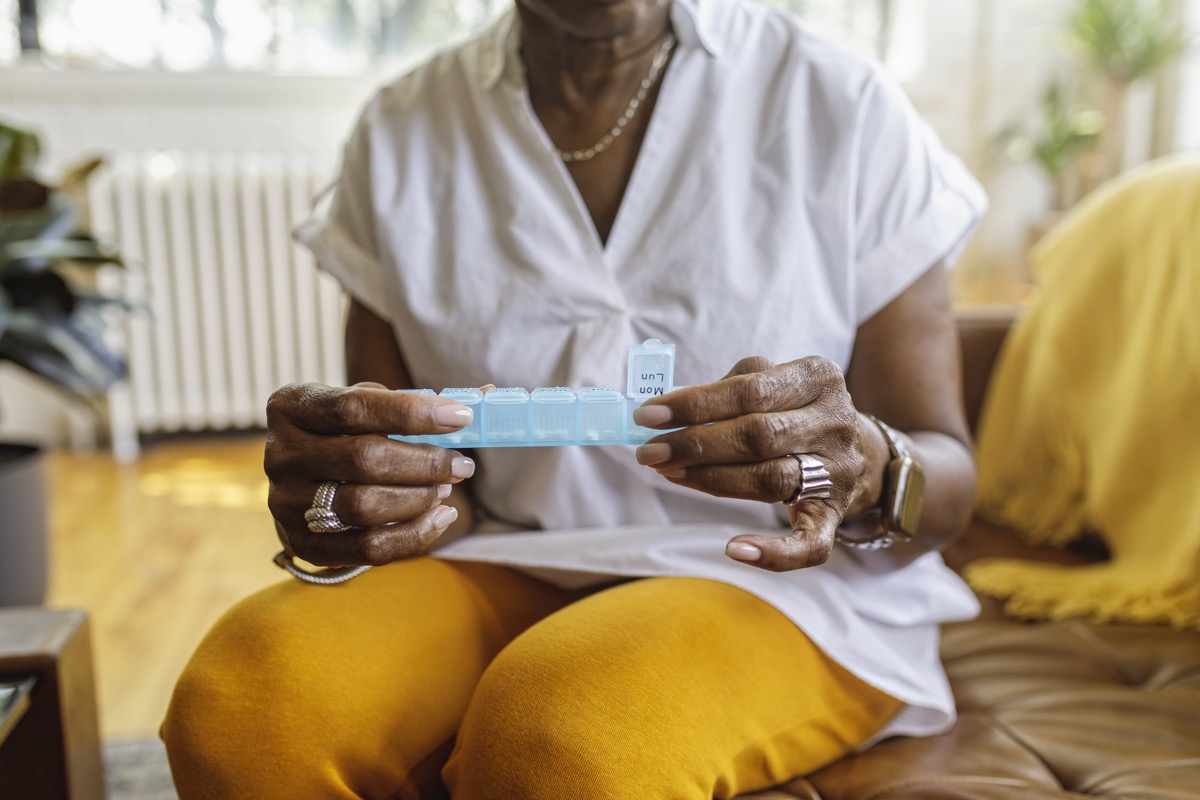Doctors Discover the Optimal Time to Take Your Blood Pressure Medicine — Best Life

It’s estimated that nearly half of all U.S. adults have hypertension, or high blood pressure, which is a risk factor for heart disease and stroke. However, according to the Centers for Disease Control and Prevention (CDC), only about 59 percent are aware that they have hypertension—roughly the same number who are currently taking medication to lower their blood pressure.
But of the group taking medication, only 20 percent have their blood pressure under control. There are many possible reasons for this, including lifestyle factors like diet and exercise, as well as not regularly seeing the doctor to evaluate current medication doses. And according to a new study, the time of day you take your blood pressure medicine can also significantly affect how well it’s working.
RELATED: Lowering Your Blood Pressure Can Reduce Dementia Risk by 15%, Scientists Say.
Researchers compared morning vs. bedtime dosing of blood pressure medicine.For a new study published this week in the journal JAMA Network Open, researchers performed a clinical trial to learn whether taking blood pressure medication in the morning or at bedtime proved more effective.
To arrive at their results, they enlisted 720 patients with hypertension, all of whom had no prior antihypertensive treatment or had discontinued such medications for two weeks before the study.
Participants were divided into two groups—one that took blood pressure medicine in the morning, between 6:00 and 10:00 am, and another that took the drugs at bedtime, between 6:00 and 10:00 pm.
Regardless of dosage time, participants all received 20mg of olmesartan, an angiotensin II receptor blocker (ARB), as well as 5 mg of amlodipine, a calcium channel blocker. The study lasted 12 weeks, but dosage amounts were adjusted at weeks 4 and 8 based on each individual’s blood pressure measurements.
RELATED: If You’re Over 65, This Supplement Could Lower Your Blood Pressure, New Research Shows.
Taking blood pressure meds at night proved more effective.The researchers determined that “bedtime dosing provided better control of nocturnal blood pressure and improved the circadian rhythm, without reducing the efficacy on mean daytime or 24-hour blood pressure, or increasing the risk of nocturnal hypotension.”
In other words, both groups had similar blood pressure readings in the daytime, but the bedtime group had healthier blood pressure readings while sleeping (nocturnal blood pressure).
As MedicalNewsToday explains, “Typically, blood pressure decreases by 10–20% during the night, as it follows the natural circadian rhythm.”
When this doesn’t happen, it can cause frequent waking to urinate, sleep apnea, and difficulty breathing. It can also further the risk of heart disease, stroke, diabetes, metabolic syndrome, obesity, and kidney failure.
RELATED: Doctors Sound the Alarm on Common Heart Conditions: “Like a Ticking Time Bomb.”
What does this research mean for you?Most importantly, never make any changes to your medication regimen or schedule without first consulting your doctor.
There were also several limitations to the study, including that all participants were from China and did not have cardiovascular disease. Additionally, it was a short-term study and only accounted for specific medications.
However, the researchers wrote that they believe the findings “support the potential advantages of bedtime administration” and offer new evidence to further research into antihypertensive chronotherapy, which uses a person’s circadian rhythms to time their medication doses.
We offer the most up-to-date information from top experts, new research, and health agencies, but our content is not meant to be a substitute for professional guidance. When it comes to the medication you're taking or any other health questions you have, always consult your healthcare provider directly.